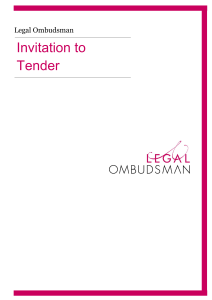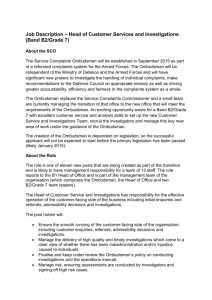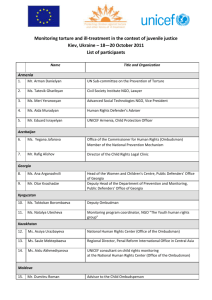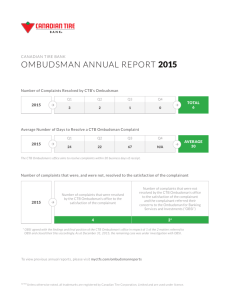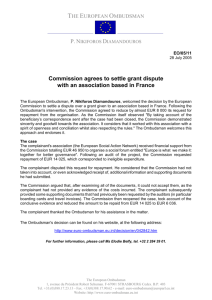Student Ombudsman
advertisement
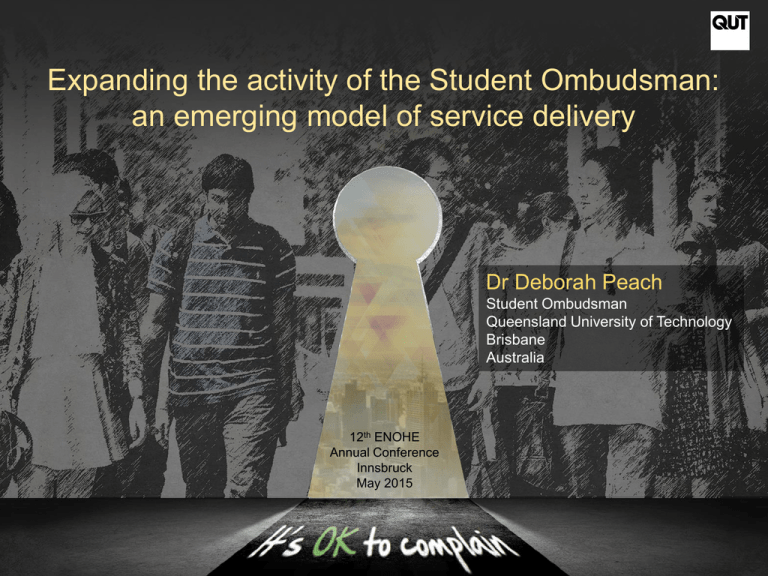
Expanding the activity of the Student Ombudsman: an emerging model of service delivery Dr Deborah Peach Student Ombudsman Queensland University of Technology Brisbane Australia 12th ENOHE Annual Conference Innsbruck May 2015 National Context Challenging times in Australian Higher Education About Queensland University of Technology • 6 faculties • 2 Institutes • 6 Divisions • 45,575 students enrolled in 2013 • 7,162 international students • 2,453 Higher Degree Research • 4,534 FTE staff • Total income $889.3m Main campuses at Gardens Point and Kelvin Grove, with a shared campus at Caboolture and research facilities at numerous sites around Brisbane. Understanding in order to improve practice In order to improve practice ‘one must learn to know and understand what one wants to transcend’ (Engestrom, 1999, p.33) History of the service 2014 – current 2009 – 2013 Dr Deborah Peach Ray Morley ENOHE 2015 Innsbruck ENOHE 2010 Vienna 2005 – 2009 2001 – 2004 Dr Neville Bofinger Professor Rodney Wolff ENOHE 2005 Vienna The Student Ombudsman’s Office as an activity system Activity system a strong unit of analysis to understand complex interactions and relationships that evolve over time and produce actions and operations that are directed towards goals associated with activity. Mapping and making visible the activity Instruments, Mediating artefacts Subject Rules Object Community Outcome Division of labour Source: Matt Bury 2012 Interacting elements of the Activity System Object: the raw material or objective at which the activity is directed Subject: the individual or sub group whose agency is chosen as the point of view in the analysis Rules: explicit and implicit regulations, norms and conventions that constrain actions and interactions within the activity system Community: comprises multiple individuals and/or subgroups who share the same general object Division of Labour: refers to horizontal division of tasks between members of the community and to the vertical division of power and status The object/motive of the activity • an environment for working and learning that is harmonious, fair and just. • access to processes that allow for grievances, disputes, problems and complaints to be resolved. The outcome of the activity Provision of a safe and healthy environment for students and staff is of fundamental importance for QUT. This encompasses the relationships among people, and between them and the University, as well as the physical environments within which we go about our business. …graduates who can thrive in volatile environments over the long term, work productively in teams, and combine depth in professional knowledge with broad perspectives based on exposure to new ideas and different cultures (QUT Blueprint, 2014) The Activity: most common issues compared with previous years Issue 2014 2013 2012 *Assessment 48 43 50 Withdrawal without academic/financial penalty 28 39 41 Exclusion 26 35 31 Attendance 24 37 39 *Teaching & Learning 23 10 10 Review of Grade 23 45 38 *Issues with the largest increase compared with previous years 2014 responding to change in HE context • Deputy Student Ombudsman • Administrative Officer • Refurbishment of office space • Improved reporting • Electronic filing system • Extension of services to include Higher Degree Research students Subject 2014 Staff Feedback 1. What impact (if any) have changes to the service had on the way student complaints and grievances are managed? 2. What has worked well in 2014? 3. What hasn't worked well in 2014? 4. What suggestions would you make for further improvements to the service? 5. Other comments? 23 responses Rules • Key point of referral • Expeditious and timely Principles of a good complaints/appeals process • High quality • • • • • • • • • Open and intelligent • Approachable • Serious and focussed • Positive and open manner • Rigorous and swift Accessibility Clarity Proportionality Timeliness Fairness Independence Confidentiality Improving the student experience (OIA, 2014) • Efficient and proactive • Accessible • Equitable • Consistent • Prompt • Rigorous and swift • Supportive • Mutual understanding • Work cooperatively • Streamlined record keeping • Avert formal escalation • Go above and beyond The SO has had an active voice in student facing issues on campus such as assessment policy development and this is welcome – the office brings an authoritative and independent voice (Student Support Services). Community • Students • Academic & Professional staff • SO team • Assistant Deans L&T • Student Advisers • Student Guild • Appeals Committee I have been impressed by the way the Ombudsman’s Office and the [Student] Guild have worked cooperatively to resolve student complaints. I also find it extremely productive how the Guild and the Ombudsman will refer students to each other (Student Guild). Division of labour • Student & staff • SO & student • SO & staff • SO & Deputy SO & Administrative Officer • SO service & other university services • SO & Queensland Ombudsman …the Ombudsman’s Office has continued to work in a positive and open manner with the Faculty (Faculty of Education). We have seen the positive effect of proactive action from the Ombudsman which I think diffused at least one situation. I’ve also been able to contact and seek advice from the Ombudsman easily and quickly (Faculty of Law). Qualities • Good communicator • Warm • Empathic • Non defensive • Astute • Creative • Decisive • Firm • Resilient …there has been good communication between the office and the Ombud and LTU around the implementation of certain aspects of policy through 2014 (e.g. maximum time limits for award courses) (Learning and Teaching Unit) Tools • Processes & policies • Written records • Student records …the [Student Ombudsman] session was seen as very valuable and in fact, an essential part of their training (Student Adviser Training). • Case summaries • Online record storage • Protocols • Reports • Training sessions • Space Streamlining QUT Ombudsman recording keeping practices and taking advantage of TRIM and it’s eDRMS capabilities [has worked well] (Governance and Legal Services). Tensions in the activity • Scope of responsibility • Closing the loop on cases • New eyes & perspectives • Administrative support • Referring students on • Volume of work • Implementing new policy or changes to existing policy Factors to consider Maintaining confidentiality Managing behaviour Frivolous or vexatious complaints and academic appeals Supporting the student (OIA, 2014) Contribution to policy - 2015 • Student Grievance • Academic Progression • Academic Honesty • Student Ombudsman • Assessment Gaps in the data – student perspective National Perspective • • • • • • • • • Complex, lengthy processes Reluctant /unsure students vs persistent challenges Staff training Preparedness to listen Complaints should be Identifying and addressing systemic problems regarded by universities as Independence of Student Ombudsman an essential ingredient to quality teaching and Plagiarism learning International students Cultural change and responding to feedback Jackson et al (2009) Discussion Expanding the activity of the Student Ombudsman: an emerging model of service delivery Dr Deborah Peach Student Ombudsman Queensland University of Technology Brisbane Australia 12th ENOHE Annual Conference Innsbruck May 2015



